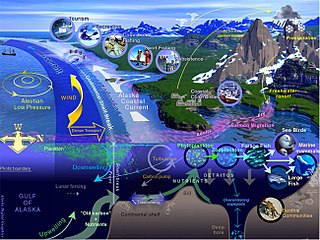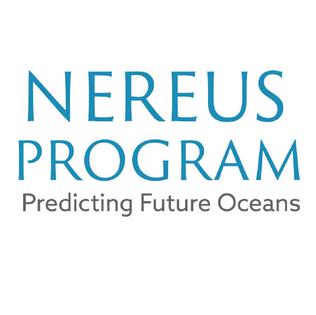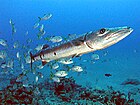Related Research Articles

Marine biology is the scientific study of the biology of marine life, organisms in the sea. Given that in biology many phyla, families and genera have some species that live in the sea and others that live on land, marine biology classifies species based on the environment rather than on taxonomy.

A seamount is a large geologic landform that rises from the ocean floor that does not reach to the water's surface, and thus is not an island, islet or cliff-rock. Seamounts are typically formed from extinct volcanoes that rise abruptly and are usually found rising from the seafloor to 1,000–4,000 m (3,300–13,100 ft) in height. They are defined by oceanographers as independent features that rise to at least 1,000 m (3,281 ft) above the seafloor, characteristically of conical form. The peaks are often found hundreds to thousands of meters below the surface, and are therefore considered to be within the deep sea. During their evolution over geologic time, the largest seamounts may reach the sea surface where wave action erodes the summit to form a flat surface. After they have subsided and sunk below the sea surface such flat-top seamounts are called "guyots" or "tablemounts".

Sylvia Alice Earle is an American marine biologist, oceanographer, explorer, author, and lecturer. She has been a National Geographic explorer-in-residence since 1998. Earle was the first female chief scientist of the U.S. National Oceanic and Atmospheric Administration, and was named by Time Magazine as its first Hero for the Planet in 1998.

Conservation International (CI) is an American nonprofit environmental organization headquartered in Crystal City, Arlington, Virginia.

Jane Lubchenco is an American environmental scientist and marine ecologist who teaches and conducts research at Oregon State University. Her research interests include interactions between the environment and human well-being, biodiversity, climate change, and sustainable use of oceans and the planet. From 2009 to 2013, she served as Administrator of NOAA and Under Secretary of Commerce for Oceans and Atmosphere. In February 2021, she was appointed by President Joe Biden to serve as Deputy Director for Climate and Environment in the White House Office of Science and Technology Policy.

The Census of Marine Life was a 10-year, US $650 million scientific initiative, involving a global network of researchers in more than 80 nations, engaged to assess and explain the diversity, distribution, and abundance of life in the oceans. The world's first comprehensive Census of Marine Life — past, present, and future — was released in 2010 in London. Initially supported by funding from the Alfred P. Sloan Foundation, the project was successful in generating many times that initial investment in additional support and substantially increased the baselines of knowledge in often underexplored ocean realms, as well as engaging over 2,700 different researchers for the first time in a global collaborative community united in a common goal, and has been described as "one of the largest scientific collaborations ever conducted".

Cristina Goettsch Mittermeier is a Mexican photographer, conservationist, biologist, and author.

Large marine ecosystems (LMEs) are regions of the world's oceans, encompassing coastal areas from river basins and estuaries to the seaward boundaries of continental shelves and the outer margins of the major ocean current systems. They are relatively large regions on the order of 200,000 km² or greater, characterized by distinct bathymetry, hydrography, productivity, and trophically dependent populations. Productivity in LME protected areas is generally higher than in the open ocean.
The Deep Sea Conservation Coalition (DSCC) is an alliance of over 100 international organizations working to promote the conservation of biodiversity on the high seas. The coalition is calling for a moratorium on destructive deep-sea mining and on the United Nations General Assembly to institute a moratorium on high seas bottom trawling in order to protect seamounts, cold-water corals and vulnerable deep-sea ecosystems.
The World Commission on Protected Areas (WCPA)'s High Seas Task Force spans decades. It was officially established in 2003 following the Vth IUCN World Parks Congress where marine experts formulated a 10-Year High Seas MPA Strategy. The 10 year Strategy built upon the results of a joint IUCN, WCPA and WWF expert's workshop on high seas MPAs in January 2003: Towards a Strategy for High Seas MPAs.

Hotspot Ecosystem Research and Man's Impact On European Seas (HERMIONE) is an international multidisciplinary project, started in April 2009, that studies deep-sea ecosystems. HERMIONE scientists study the distribution of hotspot ecosystems, how they function and how they interconnect, partially in the context of how these ecosystems are being affected by climate change and impacted by humans through overfishing, resource extraction, seabed installations and pollution. Major aims of the project are to understand how humans are affecting the deep-sea environment and to provide policy makers with accurate scientific information, enabling effective management strategies to protect deep sea ecosystems. The HERMIONE project is funded by the European Commission's Seventh Framework Programme, and is the successor to the HERMES project, which concluded in March 2009.

The Institute for Marine and Antarctic Studies (IMAS) is a teaching and research institute of the University of Tasmania in Hobart, Tasmania. IMAS was established in 2010, building upon the university's partnership with CSIRO Oceans and Atmosphere and the Australian Antarctic Division in cooperative Antarctic research and Southern Ocean research.
Dr. Moritaka Hayashi is an international lawyer, scholar and author, who is widely considered a leading expert on the impact of human activity on the world's oceans. Over a period of nearly 40 years, he has published extensively on issues involving the law of the sea, including overfishing, maritime shipping and maritime security. In 2008, he served on an international commission that generated controversy by calling for the immediate suspension of bluefin tuna fishing in the Eastern Atlantic Ocean and Mediterranean Sea. He has also served as an official at the United Nations and as a diplomat for the Permanent Mission of Japan to the United Nations.
The following outline is provided as an overview of and topical guide to fisheries:
Marine Conservation Institute is a tax-exempt nonprofit ocean conservation organization working to identify and protect vulnerable ocean ecosystems worldwide. The organization is headquartered in Seattle, Washington with offices in Washington D.C. and Glen Ellen, California.
The Benguela Current Commission, or BCC, is a multi-sectoral inter-governmental, initiative of Angola, Namibia and South Africa. It promotes the sustainable management and protection of the Benguela Current Large Marine Ecosystem, or BCLME. The BCC was established in January 2007 through the signing of an Interim Agreement between the governments of Angola, Namibia and South Africa. Then, on 18 March 2013, the three governments signed the Benguela Current Convention, an environmental treaty that entrenches the Benguela Current Commission as a permanent inter-governmental organization.

The Nereus Program is a global interdisciplinary initiative between the Nippon Foundation and the University of British Columbia that was created to further our knowledge of how best to attain sustainability for our world’s oceans. In addition to the Nippon Foundation and UBC, the program partners with University of Cambridge, Duke University, Princeton University, Stockholm University, United Nations Environment Program-World Conservation Monitoring Centre and Utrecht University. The program is built around three core objectives: to conduct collaborative ocean research across the natural and social sciences, to develop an interdisciplinary network of experts that can engage in discussion of complex and multifaceted questions of ocean sustainability, and to transfer these ideas to practical solutions in global policy forums.
Kristina Maria Gjerde is a High Seas Policy Advisor for the International Union for Conservation of Nature Global Marine and Polar Program. She works on the Global Ocean Biodiversity Initiative and won the 2018 Boat International Visionary Ocean Award. Gjerde currently lives in the greater Boston area.
The marine protected areas of South Africa are in an area of coastline or ocean within the exclusive economic zone (EEZ) of the Republic of South Africa that is protected in terms of specific legislation for the benefit of the environment and the people who live in and use it. An MPA is a place where marine life can thrive under less pressure than unprotected areas. They are like underwater parks, and this healthy environment can benefit neighbouring areas.

Sustainable Development Goal 14 is about "Life below water" and is one of the 17 Sustainable Development Goals established by the United Nations in 2015. The official wording is to "Conserve and sustainably use the oceans, seas and marine resources for sustainable development". The Goal has ten targets to be achieved by 2030. Progress towards each target is being measured with one indicator each.
References
- ↑ Defying Ocean's End website
- ↑ Defying Ocean's End Office Biographies Archived 2008-12-01 at the Wayback Machine
- ↑ Defying Ocean's End book
- ↑ DOE Partners Archived 2008-12-01 at the Wayback Machine
- ↑ About DOE Archived 2008-12-01 at the Wayback Machine

